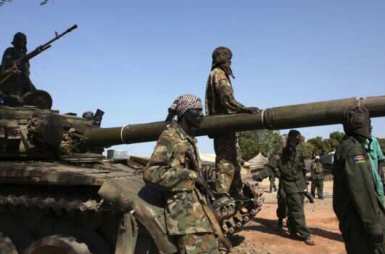S. Sudan rebels accuse army of occupying Rubkotna despite truce agreement
May 9, 2014 (KAMPALA) – South Sudanese rebels have accused the national army (SPLA) and its allied mercenaries of continued attacks on its positions in Unity state despite a peace agreement signed on Friday between the countries rival leaders.

Kuon says the SPLA and fighters from the SSLA, former militias led by Mathew Pul Jang, had launched a series of aggressive attacks on Friday morning which had forced them to withdraw from the area.
“This morning we have received an offensive attack on our positions by the government troops. They have penetrated in Rubkotna county [and] we have withdrawn peacefully without responding to them,” said Kuon.
Gen. Kuon claim rebel forces withdrew from Rubkotna amid concerns civilians sheltering in a United Nations base in the area could get caught up in the violence.
“We fear [for the] thousands of lives of people in the UNMISS camp. We could not respond to their (the SPLA) bombardments and we tactically withdraw from the area,” he said.
An aid worker at the UN’s Rubkotna camp told Sudan Tribune on condition of anonymity that a civilian was shot dead after government troops began firing at random after entering the town.
“There was random shooting, even some of the bombs landed inside the UN compound where thousands seek shelter,” the aid worker said.
The aid worker claims many of the fighters were from JEM, as well as the Sudan People’s Liberation Movement/Army-North (SPLM/A-N), which is currently leading an insurgency against Sudan’s central government in South kordofan and Blue Nile states.
The aid worker said the Sudanese rebels had entered the region in armoured military convoys with deadly ammunitions.
The South Sudanese government and the rebel SPLM/A in Opposition signed Friday’s peace agreement following face to face talks between their respective leaders, president Salva Kiir and Riek Machar – their first since conflict erupted in the country in mid-December last year.
However, Kuon says rebels would not wait for a direct order from their boss while the SPLA and their allies are attacking their base in the oil hub town of Bentiu, the capital of Unity state.
“We have given 12 hours for the SPLA and their allies to withdraw from Rubkotna. Failure to comply with our order will lead to imminent attacks on them,” said the rebel general.
He claims the government is an enemy of peace and has repeatedly failed to abide by the existing cessation of hostility agreement.
The deal was signed on 23 January, but has failed to halt fighting on the ground, with both sides accused to violating its terms.
More than a million people have been displaced both internally and to neighbouring countries, while hundreds of thousands have sought protection at UN camps across the country.
Aid agencies have repeatedly warned of a looming famine, saying the country is facing a humanitarian catastrophe.
Although essentially a political crisis, the conflict has inflamed decades old tribal tensions in the country, with atrocities and human rights abuses committed by both sides attracting international condemnation amid warnings the country was facing a possible genocide.
Face to face talks between Kiir and Machar followed several high profile visits to the country, including US secretary of state John Kerry and UN secretary-general Ban Ki-Moon.
(ST)
